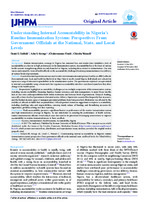| dc.contributor.author | Erchick, Daniel J. | |
| dc.contributor.author | George, Asha S. | |
| dc.contributor.author | Umeh, Chukwunonso | |
| dc.contributor.author | Wonodi, Chizoba | |
| dc.date.accessioned | 2017-09-27T06:40:07Z | |
| dc.date.available | 2017-09-27T06:40:07Z | |
| dc.date.issued | 2017 | |
| dc.identifier.citation | Erchick, D.J. et al. (2017). Understanding internal accountability in Nigeria’s routine immunization system: perspectives from government officials at the national, state, and local levels. International Journal of Health Policy and Management, 6(7): 403-412 | en_US |
| dc.identifier.issn | 2322-5939 | |
| dc.identifier.uri | http://dx.doi.org/10.15171/ijhpm.2016.150 | |
| dc.identifier.uri | http://hdl.handle.net/10566/3207 | |
| dc.description.abstract | BACKGROUND: Routine immunization coverage in Nigeria has remained low, and studies have identified a lack of accountability as a barrier to high performance in the immunization system. Accountability lies at the heart of various health systems strengthening efforts recently launched in Nigeria, including those related to immunization. Our aim was to understand the views of health officials on the accountability challenges hindering immunization service delivery at various levels of government.
METHODS: A semi-structured questionnaire was used to interview immunization and primary healthcare (PHC) officials from national, state, local, and health facility levels in Niger State in north central Nigeria. Individuals were selected to represent a range of roles and responsibilities in the immunization system. The questionnaire explored concepts related to internal accountability using a framework that organizes accountability into three axes based upon how they drive change in the health system.
RESULTS: Respondents highlighted accountability challenges across multiple components of the immunization system, including vaccine availability, financing, logistics, human resources, and data management. A major focus was the lack of clear roles and responsibilities both within institutions and between levels of government. Delays in funding, especially at lower levels of government, disrupted service delivery. Supervision occurred less frequently than necessary, and the limited decision space of managers prevented problems from being resolved. Motivation was affected by the inability of officials to fulfill their responsibilities. Officials posited numerous suggestions to improve accountability, including clarifying roles and responsibilities, ensuring timely release of funding, and formalizing processes for supervision, problem solving, and data reporting.
CONCLUSION: Weak accountability presents a significant barrier to performance of the routine immunization system and high immunization coverage in Nigeria. As one stakeholder in ensuring the performance of health systems, routine immunization officials reveal critical areas that need to be prioritized if emerging interventions to improve accountability in routine immunization are to have an effect. | en_US |
| dc.language.iso | en | en_US |
| dc.publisher | Kerman University of Medical Sciences | en_US |
| dc.rights | © 2017 The Author(s); Published by Kerman University of Medical Sciences. This is an open-access article distributed under the terms of the Creative Commons Attribution License (http://creativecommons.org/licenses/by/4.0), which permits unrestricted use, distribution, and reproduction in any medium, provided the original work is properly cited. | |
| dc.subject | Vaccines | en_US |
| dc.subject | Immunization | en_US |
| dc.subject | Health | en_US |
| dc.subject | Systems | en_US |
| dc.subject | Accountability | en_US |
| dc.subject | Nigeria | en_US |
| dc.title | Understanding internal accountability in Nigeria’s routine immunization system: perspectives from government officials at the national, state, and local levels | en_US |
| dc.type | Article | en_US |
| dc.privacy.showsubmitter | FALSE | |
| dc.status.ispeerreviewed | TRUE | |

